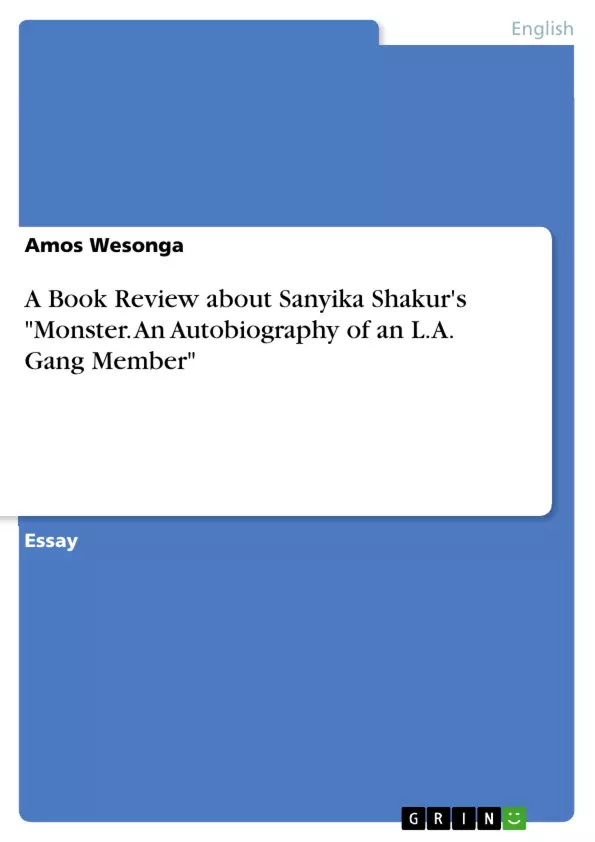The life of every society changes from time to time. These facts are real, particularly in the United States (U.S.). In 1993, a new trend of gang life began to emerge along the streets in the U.S. The book Shakur Sanyika’s Monster was the first one to provide an account of this lifestyle. The author of the book raised some concerns regarding criminal justice by revealing the acts of violence and sensationalist. Thus, this paper aims to review the book, with its significant sections including summary, significant themes in the book, strengths, and weaknesses of the text and context of the book.
Table of Contents
- Introduction
- Summary of the Book
- Themes
- Violence
- Delinquency
- Religion
- Weaknesses and Strength
- Significance
Objectives and Key Themes
This book review aims to analyze "Monster - An Autobiography of an L.A. Gang Member" by Shakur Sanyika, exploring the author's journey through gang life, his transformation, and the social and cultural context that shaped his experiences. The review will examine the book's key themes, strengths, and weaknesses, and discuss its significance within the realm of criminology.
- The impact of violence and delinquency on individuals and communities
- The influence of social pressure and poverty on gang involvement
- The transformative power of religion and individual resilience
- The relationship between power, crime, and social inequality
- The role of criminology theories in understanding criminal behavior
Chapter Summaries
The book begins by introducing Kody Scott, a young boy growing up in a challenging environment characterized by poverty and gang violence. The narrative recounts his journey into gang life, highlighting the pressures and allure of belonging to a group that offered him a sense of power and respect. The book delves into the realities of gang life, including involvement in drug dealing, shootouts, and other criminal activities. It also explores the impact of these experiences on Kody's psyche and his transformation into "Monster Kody."
The chapters focus on the key themes of violence, delinquency, and religion, illustrating their intricate connections to Kody's life. They depict his struggle to navigate a dangerous world, the factors that drove him to commit crimes, and the eventual turning point that led him to embrace a new path. The book emphasizes the role of social and economic conditions in fostering delinquency and the power of religion to offer redemption and transformation.
Keywords
The book examines the complex issues of gang life, violence, delinquency, poverty, social pressure, criminal justice, power dynamics, and religion in the context of Los Angeles. It provides insights into the experiences of a young man navigating a challenging environment, exploring the impact of social factors on his choices and the transformative power of individual resilience and faith.
Frequently Asked Questions
What is Sanyika Shakur's book "Monster" about?
The book is an autobiography of Kody Scott, a member of an L.A. gang, detailing his life of violence, his transformation into "Monster Kody," and his eventual journey toward redemption.
What are the main themes explored in the book?
The primary themes include violence, delinquency, the impact of poverty, social pressure within gangs, and the transformative power of religion.
How does the book describe the allure of gang life?
It highlights how young people in challenging environments are drawn to gangs for a sense of belonging, power, and respect that they may lack in their daily lives.
What role does religion play in Sanyika Shakur's life?
Religion acts as a turning point in the narrative, offering a path toward individual resilience and a way to escape the cycle of criminal behavior.
Why is this autobiography significant for criminology?
It provides a firsthand account of the social and economic factors fostering delinquency, helping criminologists understand the relationship between social inequality and criminal behavior.
- Quote paper
- Amos Wesonga (Author), 2018, A Book Review about Sanyika Shakur's "Monster. An Autobiography of an L.A. Gang Member", Munich, GRIN Verlag, https://www.grin.com/document/429310



